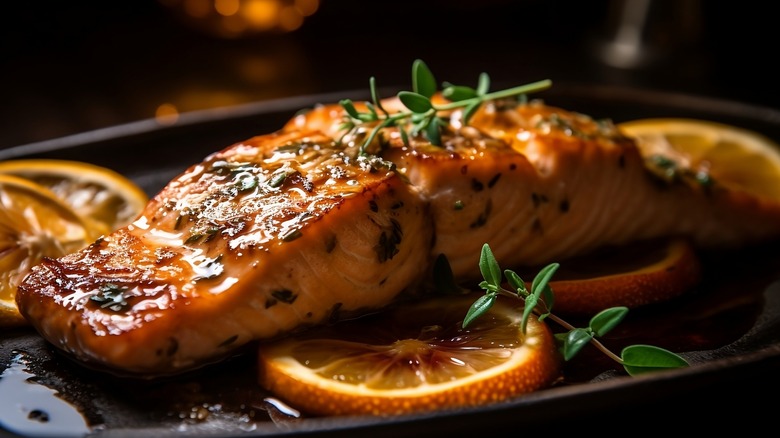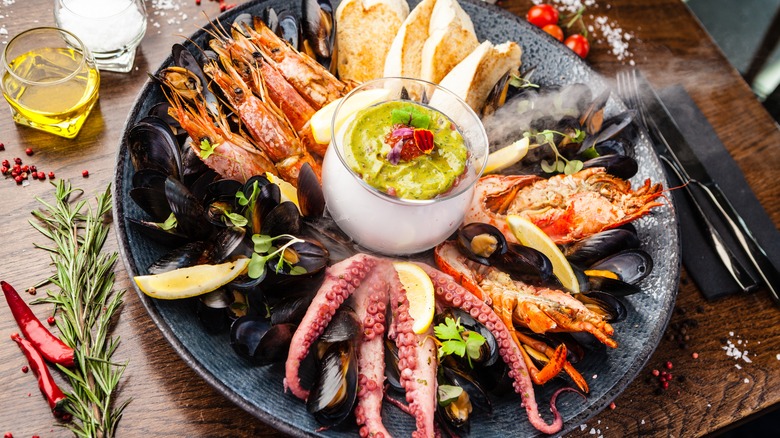What Does It Mean To Have A Pescatarian Diet?
Trying to cut down on meat or eat healthier overall? One option is to go vegan, but it takes time to fully embrace a plant-based diet. For example, you may face challenges when eating out or find it hard to meet your protein needs. The same goes for vegetarian diets, which can feel restrictive and involve a steep learning curve. A more flexible option is the pescatarian diet, an eating pattern that fits most lifestyles.
A 2022 study published in BMC Medicine found that both vegetarian and pescatarian diets may protect against cancer. The risk of developing this disease is 10% lower in vegetarians and 9% lower in pescatarians compared to meat-eaters. Moreover, pescatarian diets are rich in omega-3s and, therefore, may improve heart health.
As its name suggests, this dietary pattern allows the consumption of fish. Some pescatarians choose to eat eggs and dairy, too, but that's a matter of personal preference. Following a pescatarian diet allows you to eat healthily while still enjoying delicious meals such as pesto-baked salmon, tuna fish cakes, or lobster rolls.
What can you eat on a pescatarian diet?
About 7% of Americans refer to themselves as "pescatarians." What this means is that they eat a vegetarian diet that includes fish and shellfish, not just plant-based foods. "In my experience, they're usually very health-conscious individuals. They're looking to take control of their health through the food choices they make," nutritionist Debra King, MS, RDN, LD, FAND, said to Today's Dietitian in 2015. This approach allows them to reap the benefits of fish, such as its high protein content, and avoid the risks associated with meat consumption.
The pescatarian diet is flexible and sustainable in the long run. From a nutritional standpoint, it's similar to the Mediterranean diet, which relies heavily on fresh vegetables, nuts, seeds, fish, seafood, and olive oil. "Eating two servings of fatty fish per week will go a long way toward providing a good omega-3 to omega-6 ratio, but all fish are lean choices, allowing the calorie-conscious to eat a larger protein serving than would typically be possible with meats and poultry, or add more sides for the same calorie count," nutritionist Janis Jibrin, MS, RD, told Today's Dietitian.
Pescetarianism is a lifestyle, not a diet. You don't have to count calories, track your macros, or weigh your food, and you can use pretty much any cooking method. Still, for many followers, the point of cutting out meat is to eat healthier overall.
Are pescatarian diets really that healthy?
Most experts agree that pescatarian diets are healthier than omnivore diets but not as healthy as vegan diets. For example, a 2022 study found that vegans had a better body composition, or fat-to-muscle ratio, than pescatarians, vegetarians, and omnivores, according to the journal Nutrients. Additionally, pescatarians reported eating sweets, margarine, and other processed foods more often than the vegan group. They also consumed eggs and dairy products, which contain large amounts of saturated fat. As the researchers note, both vegetarians and pescatarians had a not-so-healthy dietary pattern.
But leaving these aspects aside, pescatarian diets have countless health benefits — assuming you don't go overboard on processed foods. First of all, fish is loaded with omega-3 fatty acids, which may help protect against heart disease, stroke, and cancer. These nutrients also fight inflammation and may improve your blood lipids, says the Harvard T.H. Chan School of Public Health. Plus, some fish species contain just as much protein as meat and poultry but are much lower in saturated fat.
For instance, a 3.5-ounce serving of skipjack tuna has 22 grams of protein and 0.3 grams of saturated fat, while chicken thighs boast 16.5 grams of protein and 4.5 grams of saturated fat per 3.6 ounces. The latter has more than double the calories in tuna. On top of that, fish consumption can boost bone health and slow cognitive decline, leading to a lower risk of Alzheimer's disease, notes a 2013 review featured in the Nutrition Bulletin.
How to transition to a pescatarian diet
Transitioning to a pescatarian diet is easier than becoming a vegan or vegetarian. First, you'll want to learn about the different types of fish and how they impact your health. For example, bigeye tuna and other species are high in mercury and should be avoided, says the U.S. Food and Drug Administration. The best fish to eat (which are also the lowest in mercury) include salmon, cod, herring, shrimp, anchovies, squid, crab, tilapia, and sardines.
Next, decide how you want to go about it. Some people choose to cut out meat from day one, while others prefer a more gradual transition. If, say, you normally eat meat for lunch and dinner, you could start by replacing one meat-based dish per day with fish or seafood. Alternatively, commit yourself to eating fish six days per week and have a "cheat" meal on Sundays (or whenever it works best for you). Cut out meat entirely after a few weeks, but don't punish yourself for slipping up.
Most importantly, try different types of seafood and experiment with new recipes. The same food can taste completely different, depending on how it's cooked and served. Take tuna salad, for example. You can keep it simple and add just a few veggies, or you can turn it into a culinary masterpiece by using capers, garlic, pecans, Greek yogurt, pasta, eggs, and other extras. Also, some fish recipes will satisfy pescatarians and meat eaters alike, so they're ideal for the whole family.



